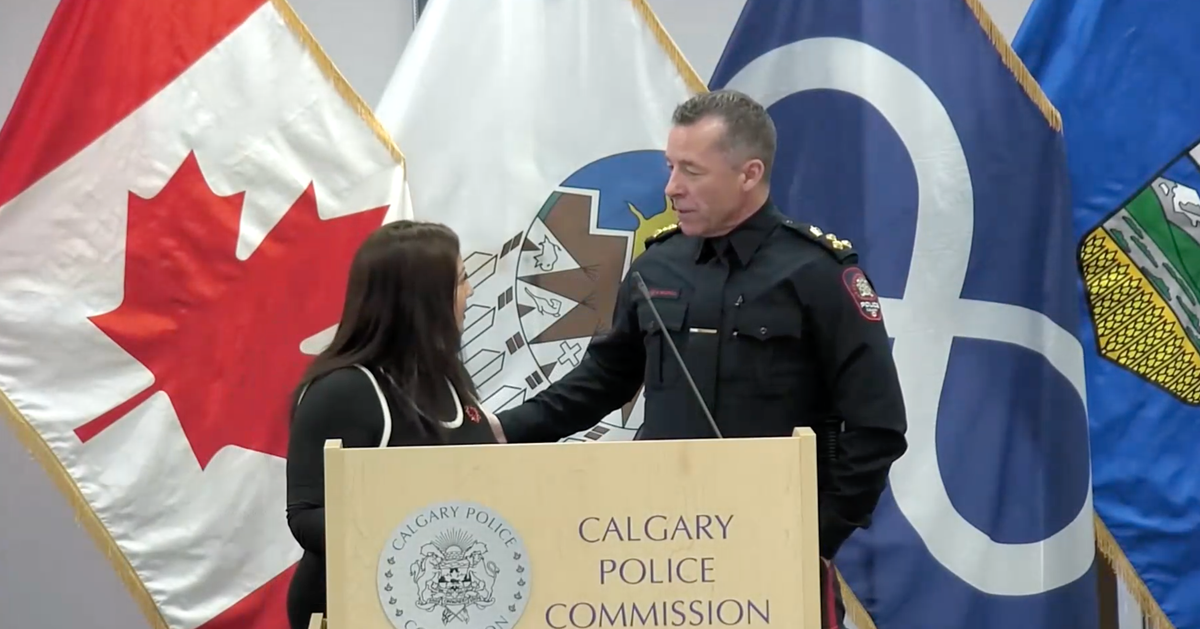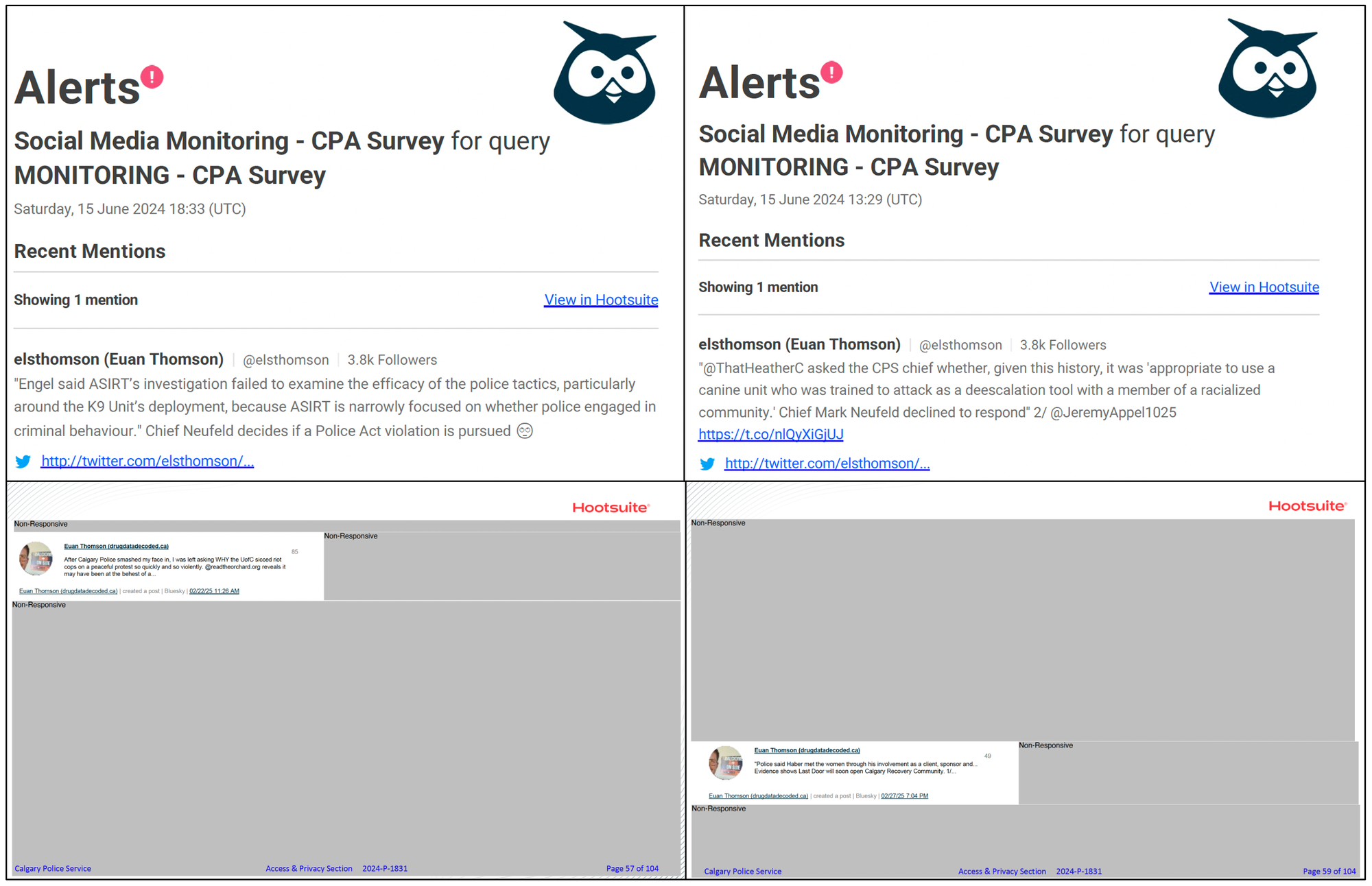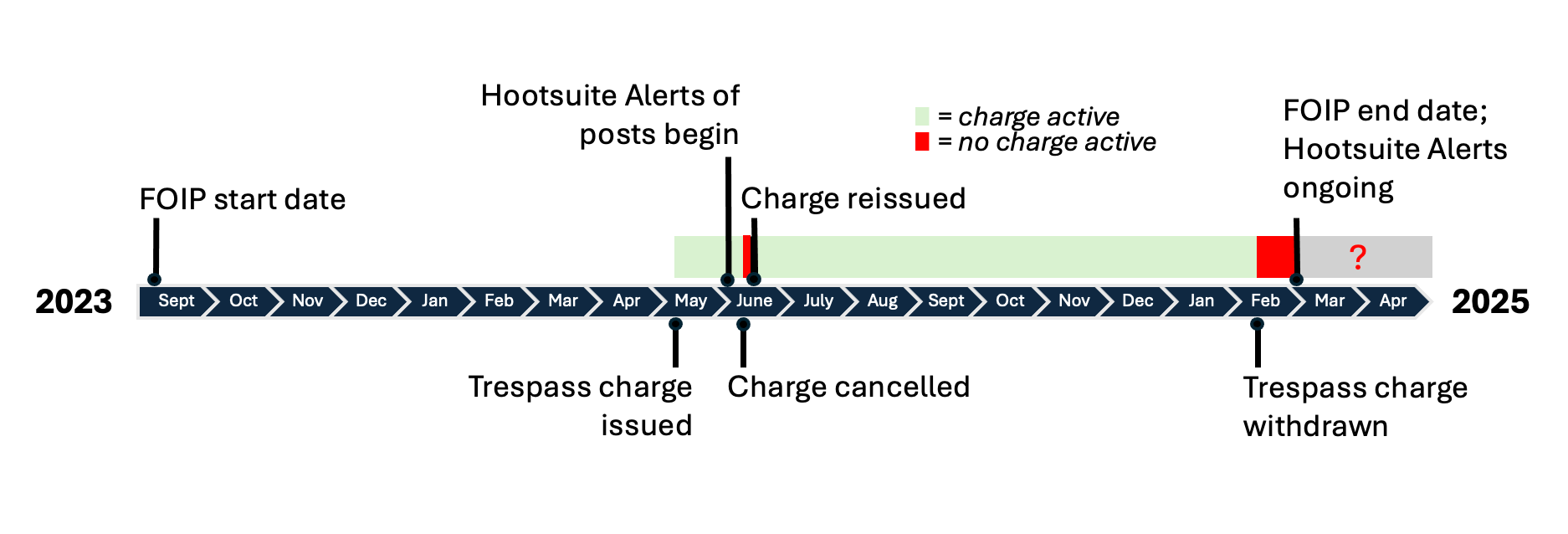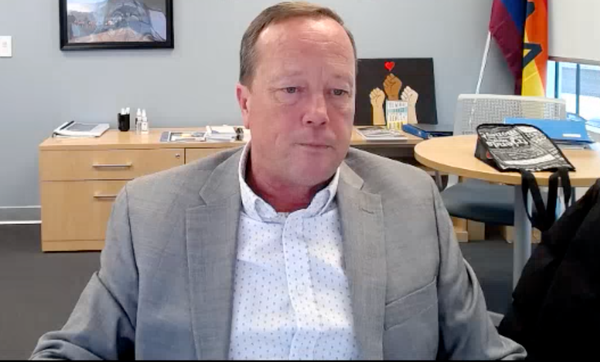Calgary police is monitoring social media of citizens
As Chief Mark Neufeld announces his resignation, a ten-month investigation by Drug Data Decoded reveals extensive social media monitoring by his media relations unit that could violate privacy regulations.

CBC is reporting that Chief Mark Neufeld has announced his resignation two years ahead of his contract end date. The reason for his resignation remains unknown.
At the March 25, 2025 Calgary Police Commission meeting, Drug Data Decoded asked Chief Mark Neufeld if Calgary Police Service (CPS) has "active contracts with Dataminr or other social media surveillance companies, and if so, have they been used in surveillance of private citizens during the protests against Palestinian genocide?”
The Chief responded that “the answer is no... we do not use Dataminr currently in the way that you've referred.”
While Chief Neufeld failed to respond to the part concerning “other social media surveillance companies,” documents obtained by Drug Data Decoded demonstrate extensive social media surveillance of private citizens by CPS using Hootsuite software.
The documents, initially requested through a freedom of information submission for correspondence mentioning this author, was stonewalled by CPS for nine months. One hundred and four pages of heavily redacted documents were finally released after Order F2025-04 was issued by Alberta’s Information and Privacy Commissioner on February 14, 2025.
Dataminr has gained infamy for its role in helping police monitor Black Lives Matter and Palestinian genocide protesters through the company's close ties to social media platform X/Twitter. However, Dataminr is just one of several software platforms that police can use to monitor citizens' speech.
Among these is Vancouver-based Hootsuite. The documents reveal at least thirty-four instances in which Hootsuite harvested and compiled posts by this author from X, Reddit, Bluesky and the Drug Data Decoded newsletter platform between June 2024 and March 2025. These were delivered to the inbox of a CPS communications advisor as "Alerts" and "Viral Alerts," presumably named so when a social media post surpasses a set threshold of engagement.
The automated Hootsuite emails included Artificial Intelligence (AI)-generated summaries of the posts.
CPS did not respond to questions sent by Drug Data Decoded on April 16 about its policy governing the use of AI in surveillance and declined to share the CPS Privacy Impact Assessment governing its use of Hootsuite. Likewise, CPS declined to discuss any details on whether Hootsuite owns the compiled data or their AI renderings.
Of thirty-four social media posts by this author harvested by Hootsuite for CPS, two made no mention of CPS either directly or indirectly. One of these posts cited New Westminster police on sexual assaults linked to a substance use recovery centre. The other was to announce that the Alberta Crown Prosecutor Service dropped a Trespass to Premises Act charge, levied against the author following his participation in the May 9, 2024 protest against the genocide of Palestinians at the University of Calgary.
CPS Director of Strategic Communications Michael Nunn explained the collection of social media posts to Drug Data Decoded by suggesting that his department "pulls in open-source social media relative to variations of the 'Calgary Police Service,' 'CPS' or 'Chief Mark Neufeld.'" While this fails to explain why two posts unrelated to CPS were "pulled in," there are deeper problems concerning the collection of these data by CPS.
No policing of policy
The CPS “Internet Investigations and Criminal Intelligence” policy regulates that research and collection of social media data must be passive and based on a specific investigative purpose concerning criminal intelligence, "threat-related information" or investigative leads.
In response to questioning by Drug Data Decoded, Nunn insisted that the social media data "is not collected or used in any form of investigation." This framing appears to allow the Strategic Communications Division, which operates out of the Office of the Chief, to circumvent CPS policy on collection and research of citizens' social media communications.
Nunn revealed that "issues management... includes scanning open source (information that is already in the public domain) to identify anything that relates to the CPS. This is important as we look to make sure our Service is listening and responsive to community needs. This is standard practice for large organizations including government entities."
The federal Office of the Privacy Commissioner ruled in 2013 that government monitoring and collection of personal information from the personal Facebook page of professor and Indigenous rights activist Cindy Blackstock violated the Privacy Act. The Privacy Act restricts the collection of personal information, "whether the personal information is available publicly or not."
In 2019, the RCMP underwent a review of its online monitoring practices. Mass surveillance of the type described by CPS was not permitted under the Privacy Act and was decried by policy experts.
In 2012, Newfoundland and Labrador's Information and Privacy Commissioner stated that "it is the position of this Office that Facebook, and other social media websites should not be used by public bodies to collect, use or disclose personal information."
Personal information collected by Hootsuite includes a person's name, statements, timing of their statements and people to whom they could be connected by way of “replies” and “tags” on the social media platforms.
CPS insists that Hootsuite data collection is not connected to investigations, likely placing this surveillance at odds with federal, provincial and internal regulations. Nonetheless, Hootsuite alerts of this author's social media posts began less than four weeks after the trespass charge was issued. The alerts also persisted after February 13, 2025, when the Trespass charge was withdrawn by the Crown and during a separate period in June, during which the Trespass charge was not technically active.
CPS declined to clarify if this author's social media surveillance was initiated by the trespass charge.
The Hootsuite alerts are produced for CPS in several groupings. Among these groupings are "PAMRU" (presumably Public Affairs and Media Relations Unit), "CPA Survey" (presumably Calgary Police Association) and "Chief Neufeld Alerts." CPS did not clarify the nature of these groupings when asked by Drug Data Decoded.
While PAMRU likely corresponds to the "community needs" purpose that CPS insists follows policy, it is unclear for what purpose Calgary Police Association, the union representing sworn members of CPS, or [former] Chief Neufeld would have channels of compiled and AI-rendered social media data on private citizens.
CPS declined to respond to a request for a copy of its contract with Hootsuite and for details on when it initiated this agreement.

Hootsuite came under scrutiny in 2020 when a senior product trainer was fired after publicly criticizing the company's contract with the US Immigration and Customs Enforcement (ICE). Five years later, ICE is now disappearing people without due process to a mega-prison in El Salvador.
Oversight out of mind
According to its website, key roles of Calgary Police Commission (CPC) are “to establish policies providing for efficient and effective policing“ and “to issue instructions as necessary to the Chief in regards to those policies.” Drug Data Decoded analyzed all CPC meeting minutes from 2019 to 2025 (using search terms “social media” and “Hootsuite,” separately) but found no mention of Hootsuite, social media monitoring or related policy development.
CPC was asked on April 14 if it was aware that CPS was using Hootsuite for social media surveillance of private citizens. The Commission did not provide a response.

In 2022, the executive director of the CPS information technology and infrastructure division said the police service was working “to engage with citizens early on before the adoption of more advanced technologies,” including social media monitoring.
That does not appear to have taken place.
The authors of the 2020 report "To Surveil and Predict" quoted journalist Desmond Cole warning that "one of the most important features of surveillance is the way in which it alters our behaviour as the targets. It alters our mind, literally. It forces us to consider that we are being watched. Even if we aren’t. It pushes us to self-regulate."
The authors of that report, all lawyers, question whether "pre-emptively collecting data in the hopes of forecasting potential crime or for general information gathering is either necessary or proportionate." According to the authors, the Charter "generally requires that whenever law enforcement actors intrude into a protected sphere of privacy, they must have reasonable grounds to believe that the information sought will reveal evidence of a crime. Pre-emptive fishing expeditions could hardly satisfy that standard."
Open season on surveillance
At the same police commission meeting where then-Chief Neufeld was asked about Dataminr, Drug Data Decoded also asked if the technology would be used for surveillance of G7 protesters. Neufeld declined to comment on the G7, which is to be held in Kananaskis, Alberta on June 15-17. This leaves open the possibility that preemptive social media monitoring is ongoing by CPS.
Violent police responses to G7 protests, including in Quebec City in 2018, suggests that protest suppression is likely a key focus of CPS going into the June meeting. The G7 is increasingly held in remote locations like Kananaskis and Muskoka, Ontario to reduce visibility of protest, to control the flow of people and to simplify surveillance.
While the CPS “Internet Investigations“ policy would presumably classify such surveillance under "threat assessment" (which is not defined by the policy), the Hootsuite surveillance by its media relations department has a closer parallel in Edmonton. In August 2024, Charles Rusnell reported for The Tyee that a special "threat assessment unit" at Edmonton Police was monitoring the social media posts of criminal defense lawyer Tom Engel.
In criticizing police violence online, Engel had named two officers who were involved in a shooting. Internally, EPS treated this as "doxxing" (publishing identifying information with malicious intent), even though an officer stated that "there were no threats to harm the members or any personal information about them in the posts." In response to his naming of the officers, EPS officers were ordered to monitor Engel's online activities.
In Rusnell's reporting, a confidential source told Engel that "Edmonton police communications staff monitor social media for negative comments about the police, including by lawyers, journalists, politicians, academics and activists."
Following Rusnell’s reporting, in August 2024 Drug Data Decoded submitted a freedom of information request to Edmonton Police Service (EPS) for similar data. The FOIP office found five pages of records at the EPS Corporate Communications Division, but withheld them entirely while noting "that their [sic] may be records you are seeking access to that are held by the Calgary Police Service."
These records are currently being sought. In the meantime, Drug Data Decoded recommends that any citizen conducting social media criticism of their local police force submit a request for records of their social media monitoring.
Members of the public – particularly anyone who has been issued a ticket at a protest or posted on any social media platform about policing – are encouraged to submit a free-of-charge freedom of information request to Calgary Police Service by filling in this form:
Sign and email the form to access@calgarypolice.ca with a selfie photo in which you hold your driver's license or other government-issued identification near your face.
Note: an early version of this story indicated that the use of Hootsuite could violate federal privacy law, but Calgary police would not be subject to federal privacy law. The section suggesting this has been modified.
If you have additional information on this story, please get in touch at info@drugdatadecoded.ca, where media can also request documents related to this story.
This story was made publicly available on May 2.
Call for support: Know professionals or academics who might be interested in supporting this work? They are likely eligible to claim subscription costs for professional development – please encourage them to chip in.
Drug Data Decoded provides analysis using news sources, publicly available data sets and freedom of information submissions, from which the author draws reasonable opinions. The author is not a journalist.





